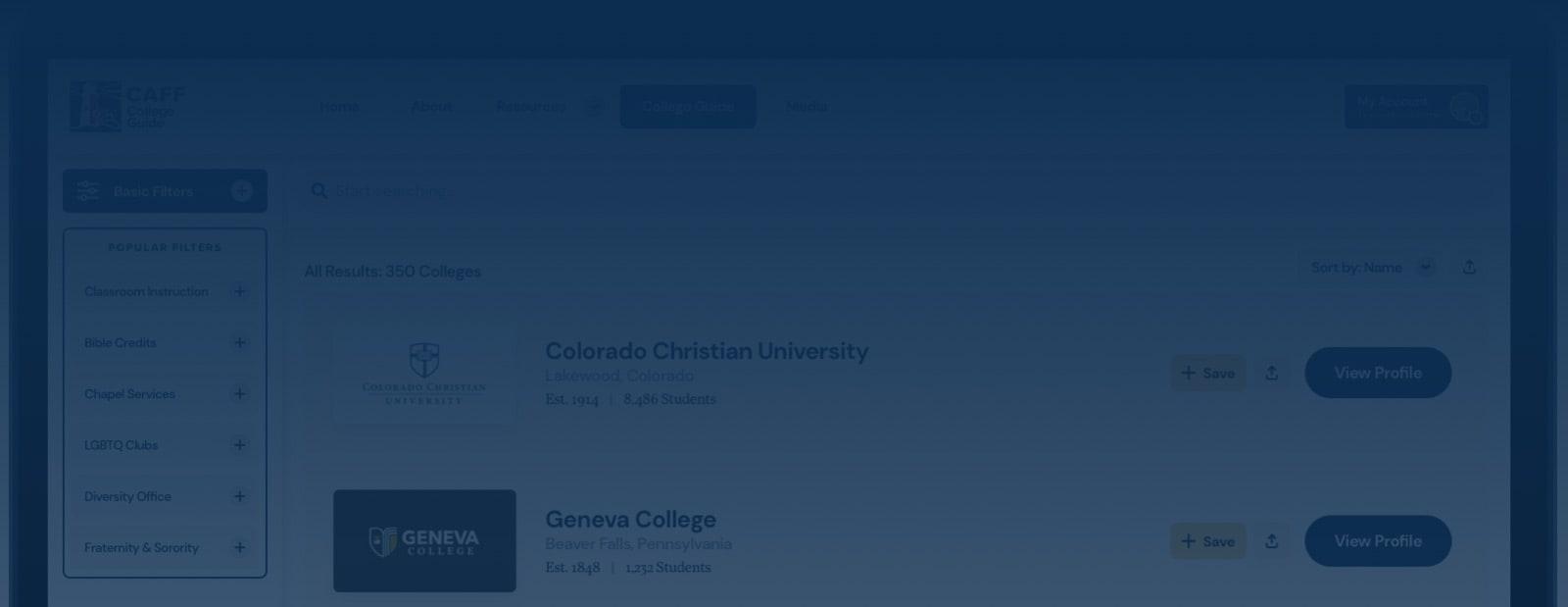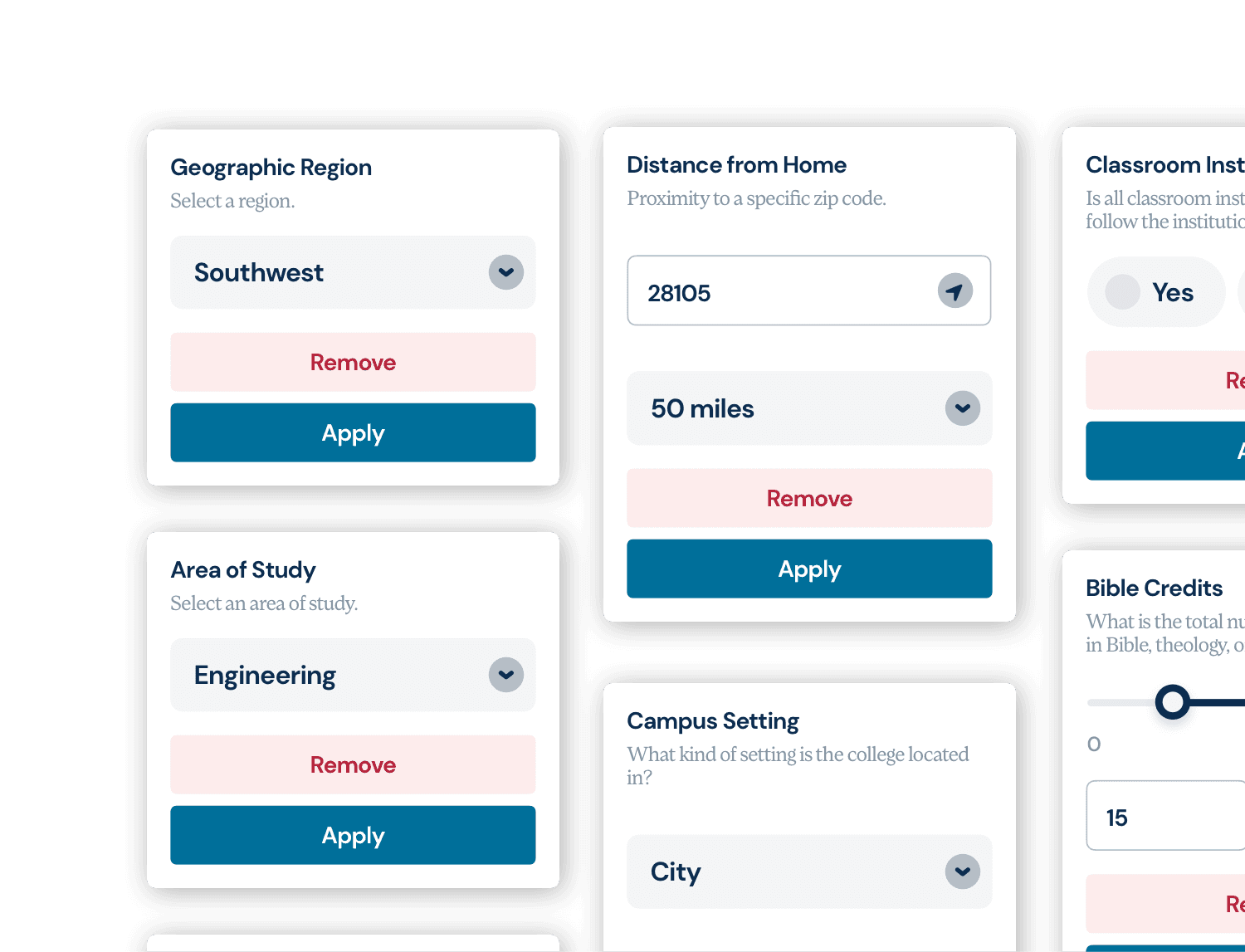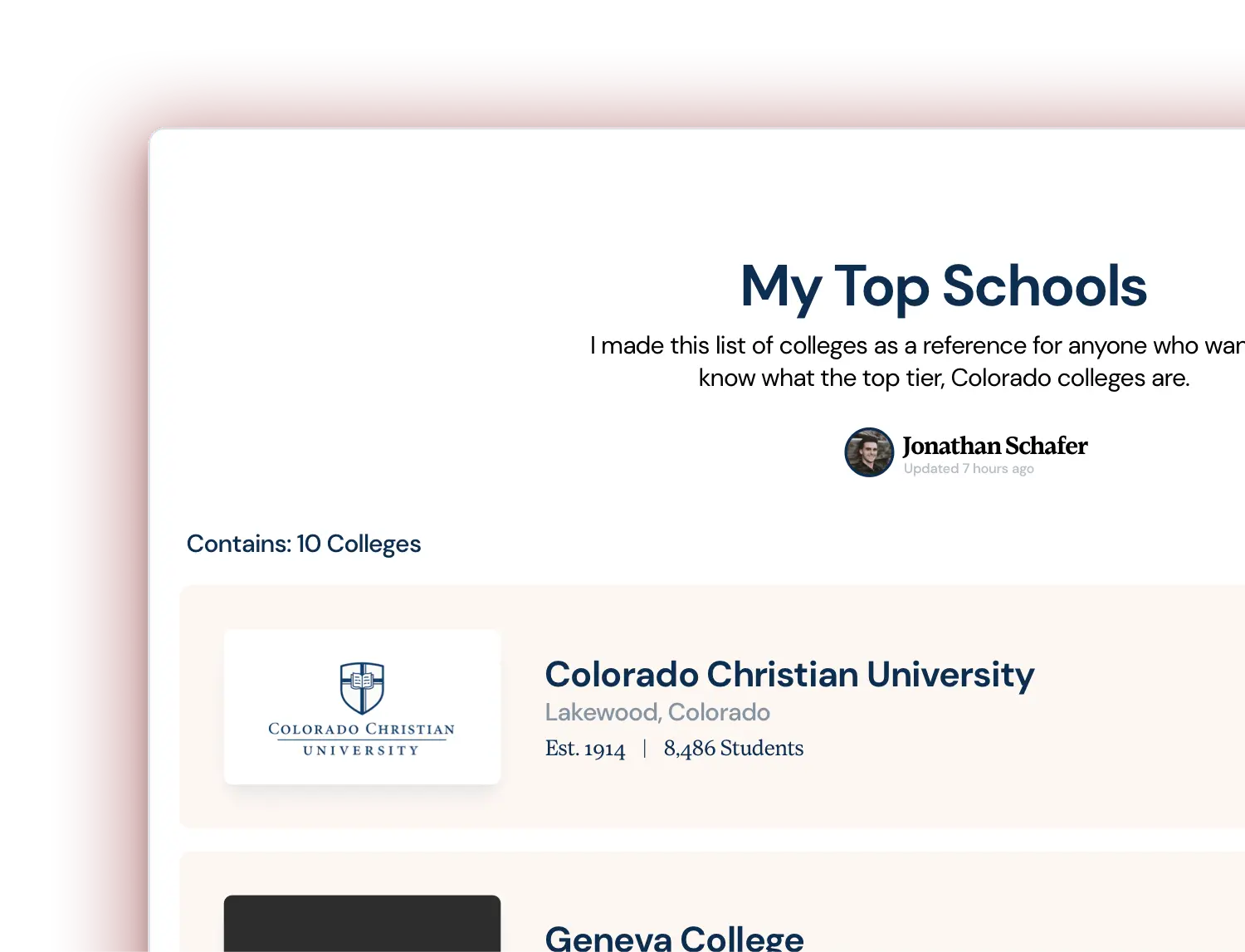
CAFF COLLEGE GUIDE
The Most Comprehensive & Accurate Online Directory of Christian Higher Education
Find the right Christian college for you.
Start your searchVERIFIED
relevant
100% free
Finding a faithful Christian college shouldn’t be overwhelming
Align your future with your faith.
Verified Data
Backed by 2,000 hours of research, we provide verified and accurate data on 250+ colleges.
Always Up-to-Date
Our annual updates ensure you’re always equipped with the most relevant and accurate information.
Free & Easy to Use
Easily discover and save the colleges that meet your specific needs—all for free.
topics
Information you care about
Basic Profile
Year Established • Theological Tradition • Location • Setting • Degrees Offered • Total Enrollment
Institutional Commitments
Components of the College Statement of Faith • Employee Expectations • Leadership Requirements • Student Club Restrictions
Inputs & Outcomes
Admissions Rate • Average SAT/ACT Scores • Undergraduate Enrollment by Race and Gender • Retention Rates • Graduation Rates
Academic Life
Undergraduate Student-Faculty Ratio • Christian Worldview Development • Undergraduate Majors and Minors • Graduate Programs • General Education Requirements
The Student Experience
Student Housing Arrangements • Intervisitation Policies • Student Behavior Expectations • Diversity Resources • Chapel Offerings
Extracurricular Offerings
Varsity Sports • Club Sports • Student Clubs • Greek Life • Parachurch Ministries
Financial Information
Total Cost of Attendance • Average Net Price after Aid • Percent of Undergraduates Awarded Financial Aid • Average Student Loan Debt • Institutional Revenues and Expenditures • Endowment Value
features
Organize your school search
Search for schools
Start with a simple search.

Filter by topics
Combine different filters to narrow down your results.

Create custom lists
Create a list of your top schools to quickly compare and find the best fit.

CAFF COLLEGE GUIDE
Frequently Asked Questions
The CAFF College Guide is an online, searchable, public resource prepared by the Center for Academic Faithfulness & Flourishing, a nonprofit organization dedicated to strengthening authentically Christian higher education.
The Guide presents independently verified information for a comprehensive range of objective measures that together provide a window into the character of each Christian college and university profiled. Unlike most other college guides, the CAFF College Guide does not grade, score, or rank institutions based on a subjective scale. Instead, the Guide simply presents trustworthy information and leaves the value judgements up to prospective students and their families.
The CAFF College Guide contains over 250 institutional profiles that present information for seven main categories:
- Basic Profile – Year Established, Theological Tradition, Location, Setting, Degrees Offered, Total Enrollment, etc.
- Institutional Commitments – Components of Statement of Faith, Employee Expectations, Student Club Restrictions, etc.
- Inputs & Outcomes – Admissions Rate, Average SAT/ACT Score, Undergraduate Enrollment by Race and Gender, Retention and Graduation Rates, etc.
- The Student Experience – Student Housing Arrangements, Intervisitation Policies, Student Behavioral Expectations, Diversity Resources, Chapel Offerings, etc.
- Extracurricular Offerings – Varsity Sports, Club Sports, Student Clubs, Greek Life, etc.
- Academic Life – Undergraduate Student-Faculty Ratio, Christian Worldview Development, Undergraduate Majors and Minors, Graduate Programs, General Education Requirements, etc.
- Financial Information – Total Cost of Attendance, Average Net Price after Aid, Percent of Undergraduates Awarded Financial Aid, Average Student Loan Debt, Institutional Revenues & Expenditures, Endowment Value, etc.
To simulate the typical college search process used by the general public, CAFF’s researchers consulted publicly available information provided on each college’s website and categorized that information according to an objective methodology. Leaders at each college were then invited to review the information collected and to propose additions or corrections. The CAFF team verified the evidence supporting each requested change before finalizing that section of the Guide. This information was combined with data reported to the U.S. Department of Education to complete each institutional profile. Colleges that participated in the data review process received a special designation on their institutional profile.
At present, the Guide includes over 250 colleges and universities that belong to one of three national Christian higher education associations: Association for Biblical Higher Education (ABHE), Council for Christian Colleges & Universities (CCCU), and International Alliance for Christian Education (IACE). Members of these three organizations have demonstrated a commitment to integrating faith and learning in their educational program and attending to the spiritual development of their students. Future updates to the Guide will include additional Christian colleges that share these same commitments. To be considered for inclusion in future updates of the Guide, please contact support@faithfulcolleges.org.
There is no charge to access the CAFF College Guide! The guide is a free resource available to anyone who creates a user profile and completes a brief survey. This access has been provided through the generous support of CAFF’s donors.
All user information collected by the CAFF College Guide is handled in accordance with its Terms of Service and Privacy Policy. CAFF does not sell personally identifiable information, such as names and email addresses, to third parties. Users who wish to receive email updates about CAFF and its partners may subscribe to the CAFF mailing list, but this subscription is not required to access the CAFF College Guide.
From time to time, CAFF or its partners may analyze trends in user characteristics and behavior to improve site performance and gain insight into the Christian college market. This analysis will be performed using anonymized data. Results from this analysis may be shared with external organizations or the public at large, but they will not include any personally identifiable information from users.
The CAFF College Guide is a one-stop shop for understanding how authentically Christian colleges and universities in America differ across various dimensions. It is intended both to raise awareness about the college options available to students seeking a Christian education and to equip users to identify places that best match their beliefs and preferences.
The Guide presents a logical starting point for comparing Christian colleges. Most users will conduct an initial search, review the results, and use the list feature to save favorite colleges to their personal profile. From there, users can conduct further investigation of their best matches by reviewing institutional websites and eventually scheduling campus visits.



